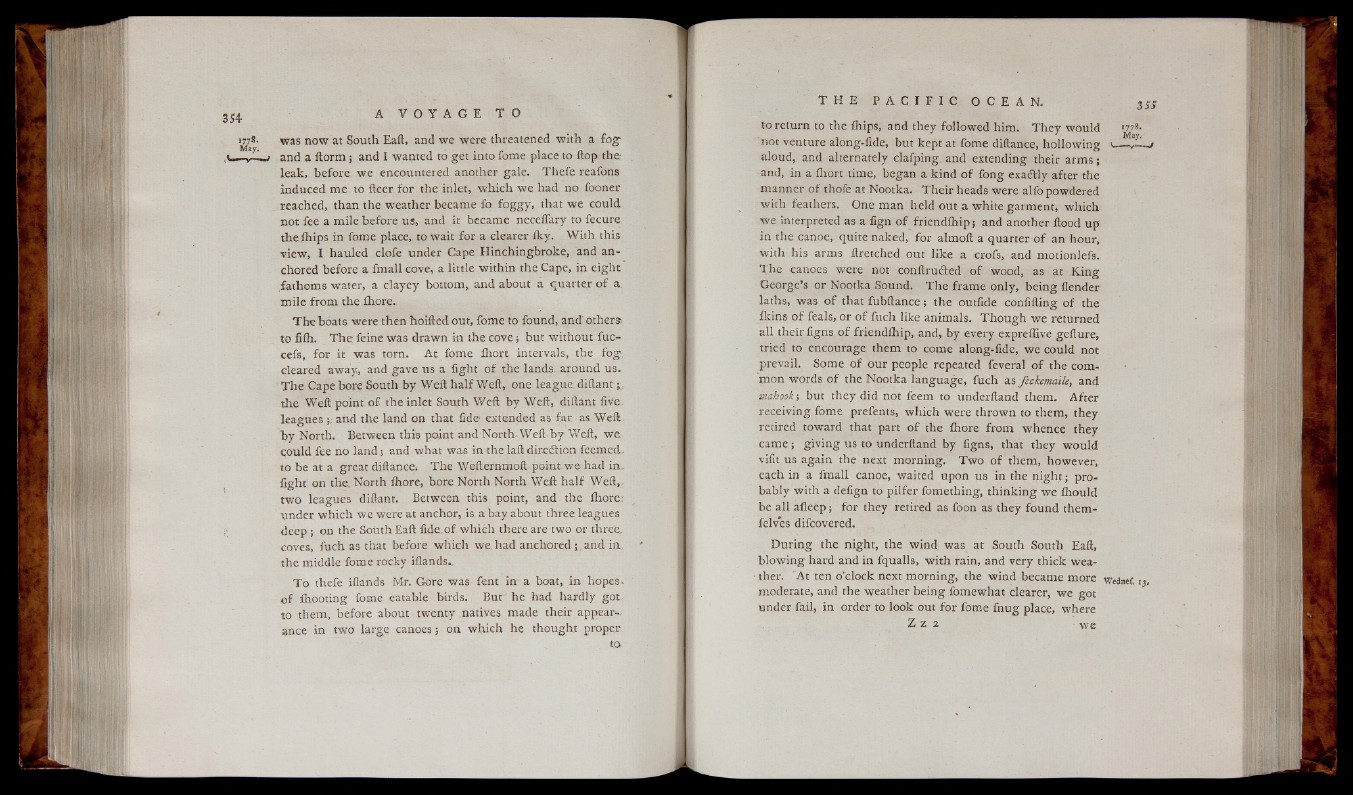
177®* was now at South Eaft, and we were threatened with a fog-
■, - t^ay’ r and a fto rm ; and I wanted to ge t into fome place to flop the
leak, before w e encountered another gale. The fe reafons
induced me to fleer for the inlet, w h ich we had no fooner
reached, than the weather became fa fo g g y , that we could
not fee a mile before us, and it became necefiary to fecure
the fhips in fome place, to wait fo r a clearer ik y . With this
view , I hauled clofe under Cape Hinchingbroke, and anchored
before a fmall cove, a little within the Cape, in e ight
fathoms water, a clayey bottom, and about a quarter o f a
mile from the fhore.
T h e boats were then hoifted out, fome to found, and' others,
to fifh. T h e feine w as drawn in the co v e ; but without fu c -
cefs, fo r it was torn. A t fome fhort intervals, the fo g
cleared away, and gave us a fight o f the lands, around us.
T h e Cape bore South by Weft h a lf Weft, one le a g u e diftant
the Weft point o f the inlet South Weft by Weft, diftant five,
leagues ;. and the land on that fide extended as far as. Weft,
b y North. Between this point and North-Weft-by Weft, w e
qould fee no lan d ; and what was in the laftdirection feemed.
to be at a great diftance. The Wefternmoft point w e had in.
fight on the. North fhore, bore North North Weft h a lf Weft,-
two leagues diftant. Between this point, and the fhore;
under which we were at anchor, is a bay about three leagues
deep ; on the South Eaft fide.of w hich there are two or three,
coves, fuch as that before w hich we, had anchored ; and in.
the middle fome rocky iflands.,
T o thefe iflands Mr. Gore was fent in a boat, in hopes,
o f fhooting fome eatable birds. B u t' he had hardly got.
to them, before about twenty natives made their appearance
in two large canoe s; on w hich he thought proper
ta
to return to the fhips, and they followed him. T h e y would
not venture along-fide, but kept at fome diftance, hollowin g
a lou d , and alternately clafping, and extending their a rm s ;
and, in a fhort time, began a kind o f fong exatftly after the
manner o f thofe at Nootka. The ir heads were alfo powdered
with feathers. One man held out a white garment, which
w e interpreted as a fign o f friendfhip; and another flood up
in the canoe, quite naked, for almoft a quarter o f an hour,
w ith his arms ftretched out lik e a crofs, and motionlefs.
T he canoes were not conftrutfted o f wood, as at K in g
George’s or Nootka Sound. T h e frame only, b e in g flender
laths, was o f that fu bftan ce ; the outfide confifting o f the
fkins o f feals, or o f fuch like animals. T h o u gh we returned
all their figns o f friendfhip, and, by every expreflive gefture,
tried to encourage them to come along-fide, we could not
prevail. Some o f our people repeated feveral o f the common
words o f the Nootka language, fuch as feekemaile, and
mahook; but they did not feem to underftand them. After
receiving fome prefents, which were thrown to them, they
retired toward that part o f the fhore from whence they
c am e ; g iv in g us to underftand b y figns, that they wou ld
vifit us again the next morning. Two o f them, however,
each in a fmall canoe, waited upon us in the n ig h t ; probably
with a defign to pilfer fomething, thin k in g we fhould
be all afleep; for they retired as foon as they found them-
felves difcovered.
D u rin g the night, the wind was at South South Eaft,
b lowin g hard and in fqualls, w ith rain, and very thick wea-
- ther. 'A t ten o’clock next morning, the wind became more
moderate, and the weather being fomewhat clearer, we got
under fail, in order to look out fo r fome fn u g place, where
Z z 2 w e